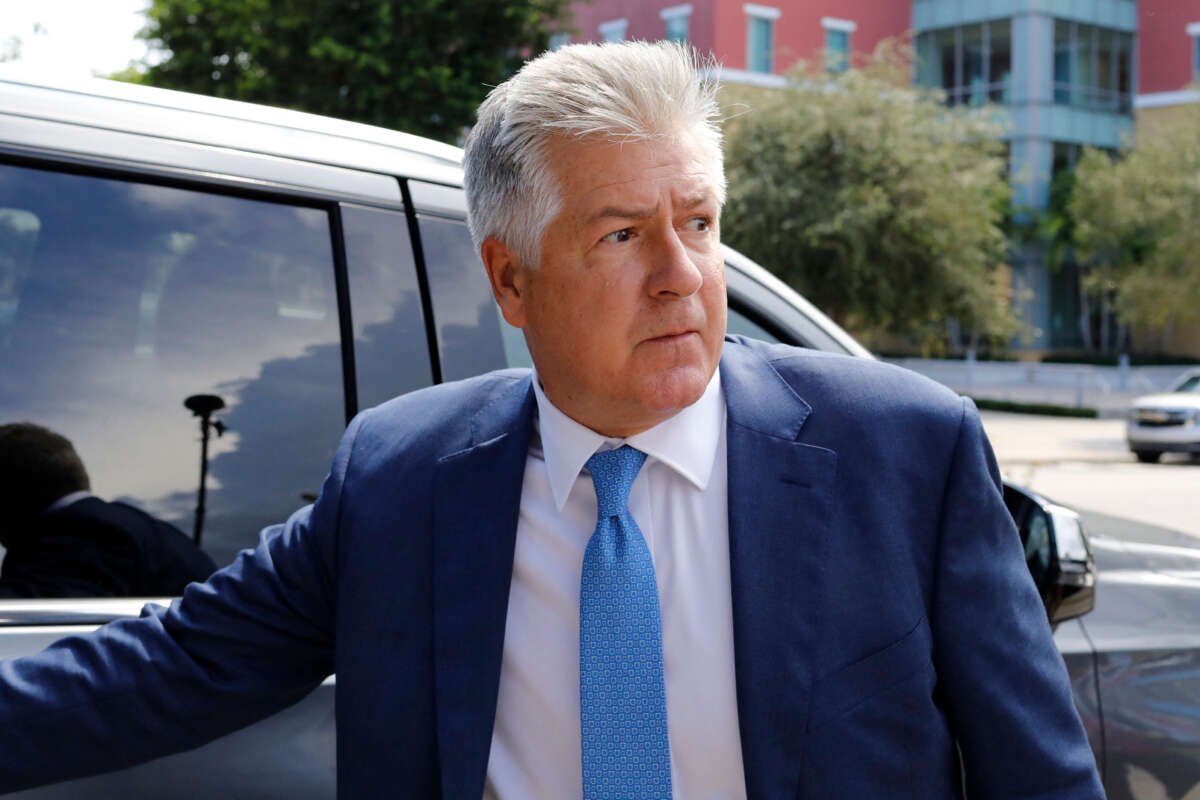Did you know that Truthout is a nonprofit and independently funded by readers like you? If you value what we do, please support our work with a donation.
The Department of Justice (DOJ) has requested a judge to compel a lawyer for former President Donald Trump to testify before a grand jury regarding the investigation into his removal of government documents and their improper retention at his Mar-a-Lago estate in Florida.
In doing so, the department explains in its briefing that they believe Trump used his lawyer’s services in committing a crime.
According to sources with knowledge of the DOJ’s filing, investigators are reportedly interested in knowing what Trump has said to Evan Corcoran, the lawyer in question, regarding his handling of government documents, many of which were marked classified. The former president had held on to the documents that should have gone to the National Archives and Records Administration (NARA) after his departure from the White House.
NARA spent the entirety of 2021 and most of 2022 painstakingly attempting to get those records back, with Trump’s lawyers during that time refusing to cooperate. In the spring of last year, the agency sought the DOJ’s help in retrieving the documents, at which point, the justice department issued a subpoena last June demanding, in part, that Trump ensure no more classified documents remained in his possession.
Corcoran was the lawyer who drafted an affidavit at that time attesting that Trump and his legal team had performed a diligent search of his property and determined he no longer had classified material in his possession. In fact, Trump actually had more than 100 such documents still at Mar-a-Lago until August, when the FBI conducted a search of the property and retrieved them.
Ordinarily, conversations between Trump and Corcoran would be protected under the attorney-client privilege. But in this latest court filing, the Justice Department alleges that Trump used Corcoran in furtherance of a crime, which removes such protections, a legal term known as the “crime-fraud” exception.
The motion is the most explicit statement yet from the DOJ stating that they believe Trump engaged in criminal activity with regards to the government documents he had in his possession.
Corcoran has testified before the grand jury before, doing so most recently just a few days ago. But he has refused to answer some questions posed to him, citing attorney-client privileges he has with Trump.
It’s unclear what those questions were, or whether they or other queries are why special counsel Jack Smith filed the motion to compel Corcoran to divulge more information beyond what has already been said. The motion itself is under seal, likely viewable only by investigators, Trump’s lawyers, the grand jury and the judge in question.
It’s unknown, too, on what basis the DOJ believes it can compel Corcoran to testify, or whether investigators believe he also committed an illegal act. Attempts to employ the crime-fraud exception do not necessarily mean that an investigation believes the lawyer in question committed a crime — a lawyer doesn’t have to be a co-conspirator in an action for the exception to be utilized, as a lawyer may undertake certain actions on behalf of a client without knowing that doing so is helping to aid in criminal behavior.
While the details of the crime Trump may have committed are unknown, sources with knowledge of the Justice Department’s filing have indicated it has to do with attempts by him to obstruct the DOJ’s and NARA’s work to retrieve the documents in his possession. “The crime-fraud argument principally concerns the same evidence of obstruction as raised in the search warrant affidavit,” The Guardian’s Hugo Lowell tweeted.
A terrifying moment. We appeal for your support.
In the last weeks, we have witnessed an authoritarian assault on communities in Minnesota and across the nation.
The need for truthful, grassroots reporting is urgent at this cataclysmic historical moment. Yet, Trump-aligned billionaires and other allies have taken over many legacy media outlets — the culmination of a decades-long campaign to place control of the narrative into the hands of the political right.
We refuse to let Trump’s blatant propaganda machine go unchecked. Untethered to corporate ownership or advertisers, Truthout remains fearless in our reporting and our determination to use journalism as a tool for justice.
But we need your help just to fund our basic expenses. Over 80 percent of Truthout’s funding comes from small individual donations from our community of readers, and over a third of our total budget is supported by recurring monthly donors.
Truthout has launched a fundraiser to add 460 new monthly donors in the next 8 days. Whether you can make a small monthly donation or a larger one-time gift, Truthout only works with your support.
